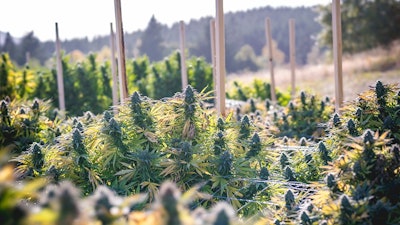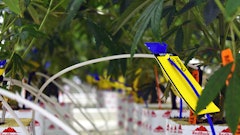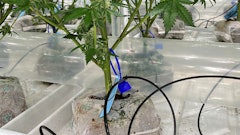
California’s fish and wildlife often pay the price for illicit cannabis cultivation practices, including unlawful water diversions for irrigation, conversion of lands, poaching, and use of prohibited chemicals and environmental contaminants.
As law enforcement officials and legislators continue efforts to combat illicit grows, particularly in Southern California’s Los Angeles, San Bernardino, Riverside, Kern and Ventura counties, the state’s Department of Fish and Wildlife (CDFW) is taking steps to help licensed cultivators with sustainable practices.
CDFW officials awarded nearly $1.8 million in funding July 8 from their Qualified Cultivator Grant Program, including roughly $1.4 million to the Mendocino County Resource Conservation District (MCRCD) for water conservation projects in the South Fork Eel River Watershed of Northern California.
In addition, the first round of funding includes roughly $400,000 to Sun+Earth, a nonprofit that certifies cannabis that’s grown under the sun, in native soil and without chemicals by fairly paid farmers and farmworkers. That grant, in part, will go toward supporting the organization in sustainability projects focused on land restoration and conservation.
“These are well-conceived and timely planning projects that will result in lasting benefits to fish and wildlife resources and the habitats they depend upon for survival,” CDFW’s acting cannabis program director Sarah Paulson said in a press release. “Supporting these entities will help preserve California’s natural resources and pave the way for future cannabis farmers in the regulated market.”
The nearly $1.4 million awarded to MCRCD will focus on three cannabis cultivation sites and will be used to design and install three rainwater collection systems, perform irrigation infrastructure upgrades, develop and implement an invasive species management plan, and install native, pollinator-friendly plants. In addition, the grant will help prepare site-specific California Environmental Quality Act (CEQA) documentation required for cannabis cultivators.
In transitioning from provisional to more formal annual licenses, CEQA requires cannabis businesses to complete the time-consuming and complicated environmental studies around the impacts of their operations and how they can reduce potential harms, which can include addressing legacy issues on their property and water conservation measures.
CDFW officials anticipate their cannabis grant program will help with remediation projects that may be unaffordable for many smaller cultivators while also promoting environmentally sustainable practices in general.
The roughly $1.8 million in CDFW’s awarded grants announced on July 8 is the first round of $6 million in total funding available through the program.
While funding from the cannabis grant program is not directly paid to cultivators, it can be secured through eligible entities, including nonprofits, government agencies or tribes. As first announced in August 2021, a noncompetitive solicitation process to apply for the available funding will remain open until April 2023.
In addition to funding the cleanup, remediation and restoration of environmental damage in watersheds and other areas affected by cannabis cultivation and related activities, grants from the program are geared to help support local partnerships in those efforts, according to the release.
As state-licensed operators generally care about conserving natural resources and following sustainable business practices, the environmental and fish-and-wildlife impacts of cannabis cultivation are perhaps more evident in illicit grows.
During a 10-day sting operation in Los Angeles County’s Antelope Valley last summer, when law enforcement seized nearly $1.2-billion of illicit cannabis harvests and plants and made 131 arrests, the already arid region had been left dry from the use of up to 3 gallons of water per cannabis plant per day, affecting potato, alfalfa and carrot farmers alike.
RELATED: Law Enforcement Seizes $1.2 Billion of Cannabis in Southern California
In addition, CDFW agents rescued 180 animals, discovered two dead bears nearby whose deaths were directly linked to pesticide use, and observed substantial alterations to streams from sediment buildups attributed to grading as well as stream crossings that cause fish impediment and other harms to nearby plants and wildlife.























